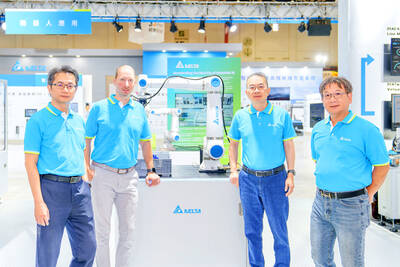New Kinpo Group (新金寶集團) yesterday said that its employees on parental leave would receive full pay, after the government extended the academic winter break until Feb. 25 amid concerns over a viral outbreak in China.
Employees asking for “disease prevention and childcare leave” would not see their work performance evaluation affected, the electronics conglomerate said in a statement.
A total of 2,500 Taiwan-based employees, including those employed through New Kinpo’s subsidiaries Cal-Comp Electronics and Communications Co Ltd (泰金寶) and Kinpo Electronics Inc (金寶), would also receive five surgical masks each as part of the group’s prevention efforts, it said.
The group has been stocking up on masks since December last year, after the first signs of the outbreak, New Kinpo chief executive officer Simon Shen (沈軾榮) said in the statement.
The group said its business operations in China have not been affected.
“More than 90 percent of Kinpo’s and Cal-Comp’s operations are in Southeast Asia, a region little affected by the coronavirus,” a company official surnamed Koo (顧) told the Taipei Times by telephone, citing Shen.
Kinpo, which focuses on the production of consumer PCs and computer peripherals, last month set up a plant to produce printers in Yueyang, China, more than 200km from Wuhan, the epicenter of the outbreak.
The company has prolonged the Lunar New Year holiday for its Chinese employees in compliance with local government regulations, the official said.
Kinpo is this year to increase production at its plants in Thailand and the Philippines by adding 120,000m2 and 150,000m2 respectively, it said.
The company aims to increase revenue by a double-digit percentage this year through its expansion efforts in Southeast Asia, Shen said at an investors’ conference in December.
Despite consecutive annual revenue declines over the past few months, Kinpo said revenue for last year rose 1.52 percent to NT$132.27 billion (US$4.4 billion).

SETBACK: Apple’s India iPhone push has been disrupted after Foxconn recalled hundreds of Chinese engineers, amid Beijing’s attempts to curb tech transfers Apple Inc assembly partner Hon Hai Precision Industry Co (鴻海精密), also known internationally as Foxconn Technology Group (富士康科技集團), has recalled about 300 Chinese engineers from a factory in India, the latest setback for the iPhone maker’s push to rapidly expand in the country. The extraction of Chinese workers from the factory of Yuzhan Technology (India) Private Ltd, a Hon Hai component unit, in southern Tamil Nadu state, is the second such move in a few months. The company has started flying in Taiwanese engineers to replace staff leaving, people familiar with the matter said, asking not to be named, as the

The prices of gasoline and diesel at domestic fuel stations are to rise NT$0.1 and NT$0.4 per liter this week respectively, after international crude oil prices rose last week, CPC Corp, Taiwan (台灣中油) and Formosa Petrochemical Corp (台塑石化) announced yesterday. Effective today, gasoline prices at CPC and Formosa stations are to rise to NT$27.3, NT$28.8 and NT$30.8 per liter for 92, 95 and 98-octane unleaded gasoline respectively, the companies said in separate statements. The price of premium diesel is to rise to NT$26.2 per liter at CPC stations and NT$26 at Formosa pumps, they said. The announcements came after international crude oil prices

STABLE DEMAND: Delta supplies US clients in the aerospace, defense and machinery segments, and expects second-half sales to be similar to the first half Delta Electronics Inc (台達電) expects its US automation business to remain steady in the second half, with no signs of weakening client demand. With demand from US clients remaining solid, its performance in the second half is expected to be similar to that of the first half, Andy Liu (劉佳容), general manager of the company’s industrial automation business group, said on the sidelines of the Taiwan Automation Intelligence and Robot Show in Taipei on Wednesday. The company earlier reported that revenue from its automation business grew 7 percent year-on-year to NT$27.22 billion (US$889.98 million) in the first half, accounting for 11 percent

A German company is putting used electric vehicle batteries to new use by stacking them into fridge-size units that homes and businesses can use to store their excess solar and wind energy. This week, the company Voltfang — which means “catching volts” — opened its first industrial site in Aachen, Germany, near the Belgian and Dutch borders. With about 100 staff, Voltfang says it is the biggest facility of its kind in Europe in the budding sector of refurbishing lithium-ion batteries. Its CEO David Oudsandji hopes it would help Europe’s biggest economy ween itself off fossil fuels and increasingly rely on climate-friendly renewables. While